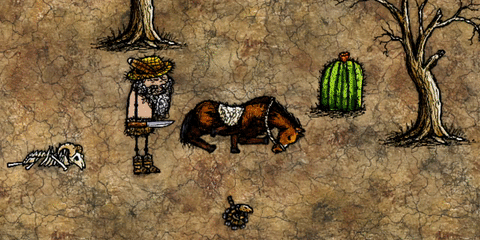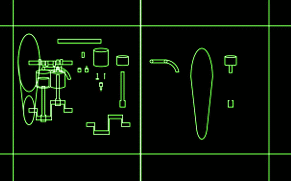One Hour One Life Forums
a multiplayer game of parenting and civilization building
You are not logged in.
- Topics: Active | Unanswered
Pages: 1
#1 2018-12-14 18:35:55
- jasonrohrer
- Administrator
- Registered: 2017-02-13
- Posts: 4,811
Update: Internal Combustion

Sheesh, an internal combustion engine has a lot of moving parts. I should know, because I just drew them all. There was so much detail that I had to lay out the whole thing in CAD software first, as printed a tracing guide. It's all still hand-drawn. Call it Computer Aided Human Drawing.

So I drew it, and now it's up to you to put the damn thing together.
The internal combustion engine was actually a major sticking-point in the design of the game: how do we get over the very steep hump that leads into industrialization? Like I mentioned in a previous update, the actual history here is far from clear. We went from very crude machines that were mostly made out of wood and powered by animals, water, or humans to finely crafted clockwork contraptions that could literally pump like well oiled machines. My guess is that it was a process of micro-refinements over about five hundred years.
So, I kinda just winged it here, assuming that if we had something spinning fast enough, that would be enough to bootstrap the whole thing via the magic of the lathe. And here we are, a week later, with a pretty accurate model of a four-stroke, two-cylinder diesel engine, complete with all major parts.
If you're interested in more details about how this works, this video explains the working of a single cylinder:
https://www.youtube.com/watch?v=fTAUq6G9apg
And this weirdly-narrated video explains how the camshaft ties the whole thing together in terms of timing:
https://www.youtube.com/watch?v=DZt5xU44IfQ
My gosh, humans are clever!
The major thought experiment in this game is this:
"It took us 4000 years to advance from stone-aged tech to the iPhone the first time around. If we had to start over from scratch, naked in the wilderness, with nothing but rocks and sticks, but we retained all knowledge, how long would it take the second time?"
The more closely I study this stuff, the more baffled I am about how we ever did it in the first place. How long would it take the second time? My current best guess: Forever.
As in, never.
Offline
#2 2018-12-14 18:53:20
- Kinrany
- Member

- Registered: 2018-01-22
- Posts: 712
Re: Update: Internal Combustion
I think the answer is that no one ever had a good plan. People kept trying different micro-refinements, as you say. Those refinements were awfully short-sighted, but there was enough people trying things that once in a while a tool worked unusually well. And then everyone would start copying and tweaking it, blindly exploring the new corner of the rules of the world we live in.
Humans are the stupidest possible species that had a chance at starting a civilization. (Othewise we'd start one earlier, when we were less smart but just smart enough.)
Humans are smart enough to solve tiny problems, but the other two ingredients are 1. trying tons of different options and 2. preserving knowledge when someone gets lucky.
Offline
#3 2018-12-14 21:33:40
- Elsayal
- Member

- Registered: 2018-11-04
- Posts: 262
Re: Update: Internal Combustion
wtf ![]()
"I go"
"find"
"iron"
Offline
#4 2018-12-14 22:51:23
- Tea
- Member
- Registered: 2018-04-23
- Posts: 341
Re: Update: Internal Combustion
Thank you Jason !
Keep up the good work ![]()
The one and only Eve Kelderman
Offline
#5 2018-12-14 23:42:42
- Glassius
- Member

- Registered: 2018-04-22
- Posts: 326
Re: Update: Internal Combustion
https://i.imgur.com/6v3qMsx.gif
"It took us 4000 years to advance from stone-aged tech to the iPhone the first time around. If we had to start over from scratch, naked in the wilderness, with nothing but rocks and sticks, but we retained all knowledge, how long would it take the second time?"
It took us 300 000 years, according to new findings ![]()
https://i.imgur.com/6v3qMsx.gif
The more closely I study this stuff, the more baffled I am about how we ever did it in the first place. How long would it take the second time? My current best guess: Forever.
As in, never.
It is easy, if you know human societies can be modeled with mathematical models and there are three major models:
1. Paleolithic. People are stuck in Lotka-Volterra equation and are depending on what they can hunt and gather. If they are too efficient, they will eradicate the area and finally meet a population collapse. This is why we were hunter gatherers for 300 000 years and we developed agriculture only after ice age end 10 000 BC.
2. Malthusianism. People are producing food, and with proper soiling they can sustain high population forever. However, every extra food is transformed into more people to the point the population is so dense, most people are on the edge of starvation. In this state every pair of hands is useful, so people are reproducing as much as they can. Prosperity is possible only after big disaster, like war or famine, when the few survivors have much resources for themselves. The prehistory, ancient and medieval times are the constant repetition of building a thriving civilization and apocalypse collapse.
3. Capitalism. The population density and sophistication of economy is increasing the competition between people to the point, where people start favoring quality over quantity. Since XIX century the economy is growing much faster than population and it seems, we escaped the Malthus trap and we will not reach again the state of near starvation.
People would need to repeat this process if we had to start from scratch. But it would be so much faster, if we conserver our knowledge ![]()
Suggestions: more basic tools, hugs, more violence, day/night, life tokens, yum 2.0
Offline
#6 2018-12-15 02:18:48
- BladeWoods
- Member
- Registered: 2018-08-11
- Posts: 476
Re: Update: Internal Combustion
I love the car, but it also feels like we got it too fast.
Last edited by BladeWoods (2018-12-15 02:19:12)
Offline
#7 2018-12-15 12:30:19
- Faro
- Member
- Registered: 2018-11-30
- Posts: 5
Re: Update: Internal Combustion
Hey Jason, when i was reading your post i remembered this book:
"What Technology Wants" from Kevin Kelly
Here a quote about the book:
"In this provocative book, one of today’s most respected thinkers turns the conversation about technology on its head by viewing technology as a natural system, an extension of biological evolution. By mapping the behavior of life, we paradoxically get a glimpse at where technology is headed-or “what it wants.” Kevin Kelly offers a dozen trajectories in the coming decades for this near-living system. And as we align ourselves with technology’s agenda, we can capture its colossal potential. This visionary and optimistic book explores how technology gives our lives greater meaning and is a must-read for anyone curious about the future."
— Summary from Viking catalog
In this book he has a theory about the question what would happen if we would repeat again from stoneage tech. He is talking about the future but also has a nice introduction where he talks about human history and how we progressed with technology like fire and farming.
Here is an interview with Kevin Kelly where he talks for 1 hour about the book.
Here is the PDF. Chapter 2
Inventing Ourselves on PDF page 30 is interesting.
Offline
#8 2018-12-16 17:06:50
- yvanhooe
- Member
- Registered: 2018-01-01
- Posts: 137
Re: Update: Internal Combustion
I still feel it is wrong for civilizations that are still figuring out if they really need buildings, who have not invented furniture or metal casting, who have no irrigation, to have internal combustion engines.
Offline
#9 2018-12-16 22:36:49
- Glassius
- Member

- Registered: 2018-04-22
- Posts: 326
Re: Update: Internal Combustion
We do not need buildings ![]() Every time spent in building is not spent on civilization running. Every resource used for building, is resource not used for civilization running. This is Nash balance output of current mechanics
Every time spent in building is not spent on civilization running. Every resource used for building, is resource not used for civilization running. This is Nash balance output of current mechanics ![]()
Suggestions: more basic tools, hugs, more violence, day/night, life tokens, yum 2.0
Offline
#10 2018-12-17 06:18:52
- yvanhooe
- Member
- Registered: 2018-01-01
- Posts: 137
Re: Update: Internal Combustion
Indeed, we currently don't need buildings. Which is a shame. I can see so many ways to make buildings necessary: for instance to avoid food rotting, to be able to store big amount of things. I could see a mechanics for setting a home inside a building and get bonuses from the things there.
For instance, we can't have a sleep mechanics in this game, but having a building as your home with a bed could give you a bonus in terms of food consumption if you are not too far. I could see the ability to have a wardrobe inside your home and insta-change to the appropriate clothes when changing biome (here again, maybe range limited).
Offline
#11 2018-12-18 16:26:02
- Elsayal
- Member

- Registered: 2018-11-04
- Posts: 262
Re: Update: Internal Combustion
I still feel it is wrong for civilizations that are still figuring out if they really need buildings, who have not invented furniture or metal casting, who have no irrigation, to have internal combustion engines.
I think that the point is not the "order", but all the mecanical part available, and machines that are now set up for future enhancement.
"I go"
"find"
"iron"
Offline
#12 2018-12-20 05:01:08
- yvanhooe
- Member
- Registered: 2018-01-01
- Posts: 137
Re: Update: Internal Combustion
Actually that makes sense: after all ancient Greeks had invented some steam engines but never really used it for anything. Similarly, internal combustion engines seem to be a solution to a problem we don't have yet. I suspect this helped Jason put in place the logic to other complex techs.
Offline
#13 2018-12-21 00:54:58
- Mobitz
- Member
- Registered: 2018-11-30
- Posts: 11
Re: Update: Internal Combustion
Actually that makes sense: after all ancient Greeks had invented some steam engines but never really used it for anything. Similarly, internal combustion engines seem to be a solution to a problem we don't have yet. I suspect this helped Jason put in place the logic to other complex techs.
I read that before gasoline engines were created/mass produced, gasoline was just dumped in a river to dispose of it. #RockefellerProblems
Offline
Pages: 1